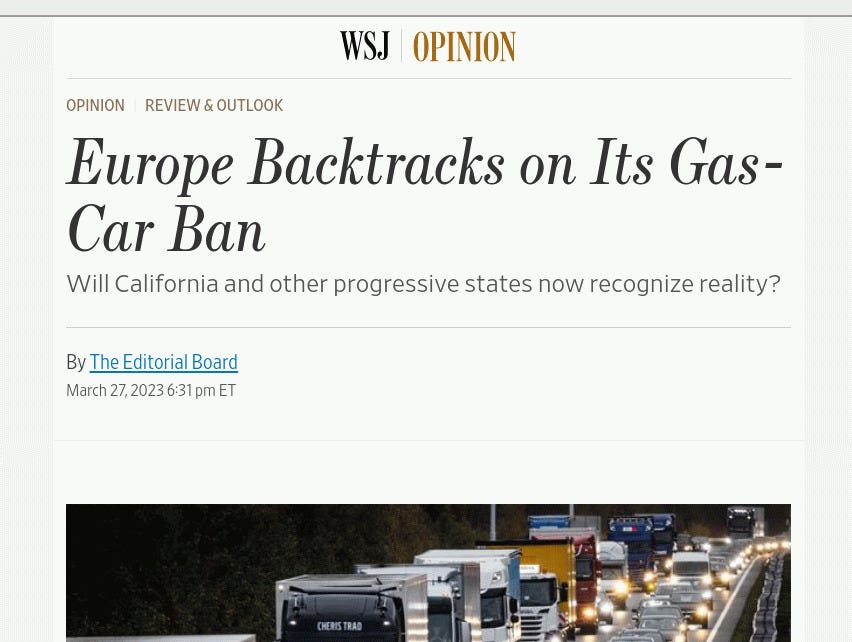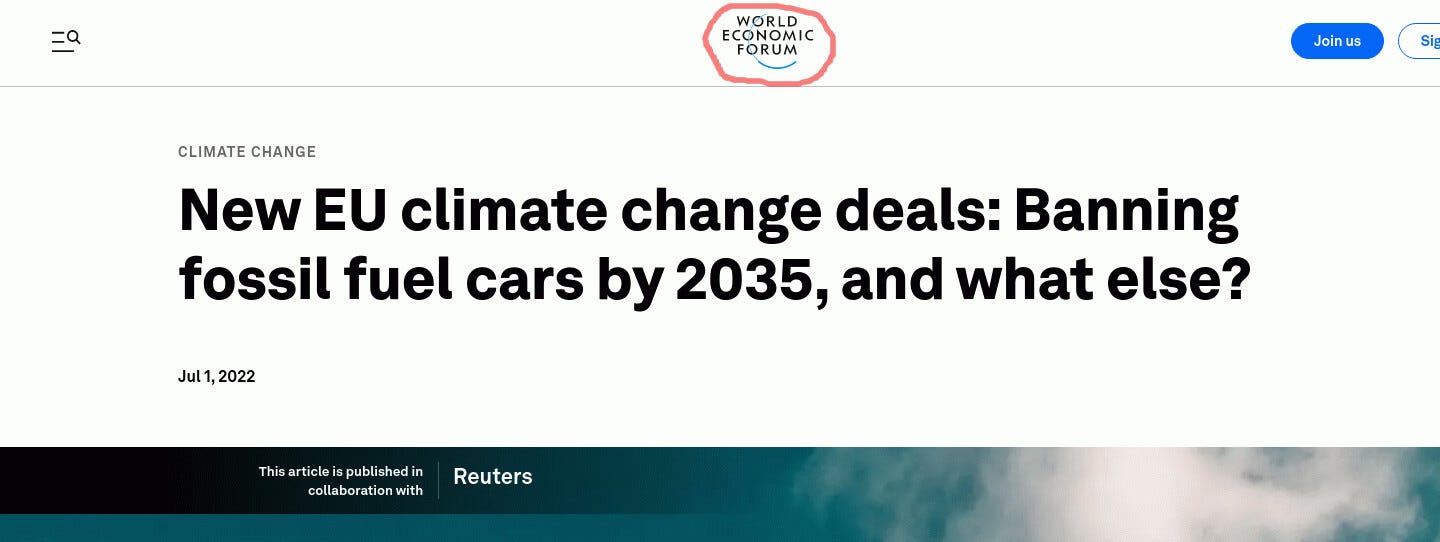Stupidity of “switch to electric” while killing power generation

Mar 28

France24, Quartz, and the Wall Street Journal (paywall-free link) report that the EU abandoned its much-ballyhooed transition to electric cars, which was supposed to culminate with a total ban on gasoline cars in 2035.

The EU’s reversal allows “the sales of new cars with combustion engines that run on synthetic fuels,” which sounds very environmentally friendly. But synthetic fuels are similar to gasoline or diesel, so the decision allows internal combustion cars to continue being produced. While electric cars will still be produced and incentivized, there is no longer a 100% mandate by 2035.
This transition was announced with a lot of pomp:

The transition was supposed to go on for 13 years after its announcement in 2022 but was abandoned only a year after its adoption. What happened?
Prodded by climate activists, the EU was pressured to ban fossil fuel vehicles and replace them with battery-powered vehicles. The problem is that such a transition is impossible:
- Transitioning to electric passenger vehicles will increase electricity demand by 25%.
- Transitioning to electric trucks will further raise electricity demand to a total of 40% increase.
- EU is phasing out fossil fuel generation and replacing it with unreliable solar and wind generation – thus decreasing power availability instead of increasing it to meet greater demand.
- As cars and especially trucks are charged at night, solar and wind power cannot contribute to charging.
Are electric cars more efficient?
Running a gasoline car involves:
- Burning gas in the internal combustion engine and converting thermal energy to mechanical energy. That’s it.
Charging an electric car’s battery from the grid and driving the car involves:
- Burning gas at the power station and converting thermal energy of gas to mechanical energy of the gas turbine. This is only moderately more efficient in a power station than gasoline cars.
- Then, losses begin:
- Converting the mechanical energy of the turbine into electrical energy in the generator involves generator losses
- Converting medium voltage from the generator into high transmission voltage involves transformer losses
- Transmitting the power along the high voltage lines involves transmission losses
- Stepping down the voltage in several substations involves transformer losses again
- In a home charging station, converting 220v power into DC for car charging again involves conversion losses
- A chemical process in the battery being charged heats the battery, involving charging losses
- Running the car’s electrical motors from the battery requires inverter losses to generate electricity for traction motors and motor losses.
Take a look at what happens when a driver needs heat in the cab:
- Heating a gasoline car in winter involves redirecting waste heat (hot antifreeze) from the engine into the cab heater, thus not requiring additional fuel.
- Heating an electric car requires a resistance heater or a heat pump, needing to eventually consume more energy from the grid – with all the above conversion losses included.
Which process (gasoline car vs. electric) is more efficient at converting fuel, burnt directly in the car engine or at distant power stations, into usable energy to propel a car traveling on a highway? The gas engines win outright.
The situation would be different if we had a clean, weather-independent, and inexpensive electrical power source. But, alas, we do not have that yet.
Last December, eugyppius wrote a nice post about Switzerland banning electric cars due to a lack of electricity to charge them.
Switzerland, Facing an Unprecedented Power Shortage, Contemplates a Partial Ban on the Use of Electric Vehicles
The Swiss Confederation usually imports electricity from France and Germany to keep the lights on over the winter, but this year neither country has any power to spare. Many French nuclear power plants are down after years of postponed maintenance, while in Germany we suffer from a superfluity of idle wind turbines and a (self-imposed) shortage of natur…
4 months ago · 703 likes · 515 comments · eugyppius
The fact that a pompously announced thirteen-year “electric car transition” was canceled only one year after it was adopted strongly suggests that the original idea was untenably stupid…READ MORE

Get your copy from our Online Store or your local book and magazine retailer
Australian Retail Locations » Uncensored Publications Limited
New Zealand Retail Locations » Uncensored Publications Limited
As censorship heats up and free thought becomes an increasingly rare commodity, we appeal to our readers to support our efforts to reach people with information now being censored elsewhere. In the last few years, Uncensored has itself been censored, removed from the shelves of two of our biggest NZ retailers – Countdown Supermarkets and Whitcoulls Bookstores – accounting for 74% of our total NZ sales.
You can help keep the Free Press alive by subscribing and/or gifting a subscription to your friends and relatives.








